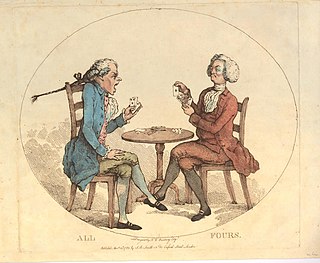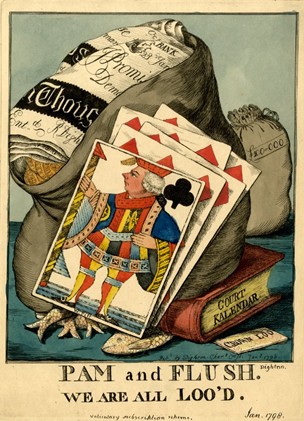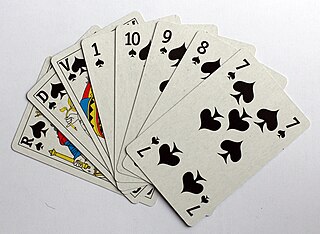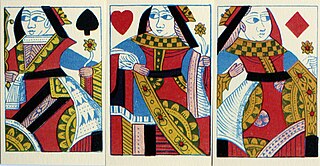
A card game is any game that uses playing cards as the primary device with which the game is played, whether the cards are of a traditional design or specifically created for the game (proprietary). Countless card games exist, including families of related games. A small number of card games played with traditional decks have formally standardized rules with international tournaments being held, but most are folk games whose rules may vary by region, culture, location or from circle to circle.

A trick-taking game is a card- or tile-based game in which play of a hand centers on a series of finite rounds or units of play, called tricks, which are each evaluated to determine a winner or taker of that trick. The object of such games then may be closely tied to the number of tricks taken, as in plain-trick games such as contract bridge, whist, and spades, or to the value of the cards contained in taken tricks, as in point-trick games such as pinochle, the tarot family, briscola, and most evasion games like hearts.

Tarot is a pack of playing cards, used from at least the mid-15th century in various parts of Europe to play card games such as Tarocchini. From their Italian roots, tarot-playing cards spread to most of Europe, evolving into a family of games that includes German Grosstarok and modern games such as French Tarot and Austrian Königrufen. In the late 18th century French occultists made elaborate, but unsubstantiated, claims about their history and meaning, leading to the emergence of custom decks for use in divination via tarot card reading and cartomancy. Thus, there are two distinct types of tarot packs in circulation: those used for card games and those used for divination. However, some older patterns, such as the Tarot de Marseille, originally intended for playing card games, are occasionally used for cartomancy.

Whist is a classic English trick-taking card game which was widely played in the 18th and 19th centuries. Although the rules are simple, there is scope for strategic play.

All fours is a traditional English card game, once popular in pubs and taverns as well as among the gentry, that flourished as a gambling game until the end of the 19th century. It is a trick-taking card game that was originally designed for two players, but developed variants for more players. According to Charles Cotton, the game originated in Kent, but spread to the whole of England and eventually abroad. It is the eponymous and earliest recorded game of a family that flourished most in 19th century North America and whose progeny include pitch, pedro and cinch, games that even competed with poker and euchre. Nowadays the original game is especially popular in Trinidad and Tobago, but regional variants have also survived in England. The game's "great mark of distinction" is that it gave the name 'jack' to the card previously known as the knave.

Ombre or l'Hombre is a fast-moving seventeenth-century trick-taking card game for three players and "the most successful card game ever invented."

Trionfi are 15th-century Italian playing card trumps with allegorical content related to those used in tarocchi games. The general English expression "trump card" and the German "trumpfen" have developed from the Italian "Trionfi". Most cards feature the personification of a place or abstraction.
Catch the ten, also called Scots whist or Scotch whist, is an 18th-century point-trick ace–ten card game that is recorded as being played only in Scotland, although evidence suggests a possible German origin. Unlike standard whist, it is played with a pack of only 36 cards, the fives and below being omitted. In the trump suit, the jack is the highest card. Despite its alternative name, it has nothing to do with standard whist.

Klaverjas or Klaverjassen is a Dutch four-player trick-taking card game that uses a Piquet pack of 32 playing cards. It is closely related to the game of Klaberjass and is one of the most popular card games in the Netherlands, traditionally played in cafes and social clubs. It offers a considerable level of complexity and depth. It has numerous variants, but its basic rules are universal.

A trump is a playing card which is elevated above its usual rank in trick-taking games. Typically an entire suit is nominated as a trump suit; these cards then outrank all cards of plain (non-trump) suits. In other contexts, the terms trump card or to trump refers to any sort of action, authority or policy which automatically prevails over all others.

Lanterloo or loo is a 17th-century trick taking game of the trump family of which many varieties are recorded. It belongs to a line of card games whose members include Nap, euchre, rams, hombre, and maw. It is considered a modification of the game of "all fours", another English game possibly of Dutch origin, in which the players replenish their hands after each round by drawing each fresh new cards from the pack.

The following is a glossary of terms used in card games. Besides the terms listed here, there are thousands of common and uncommon slang terms. Terms in this glossary should not be game-specific, but apply to a wide range of card games played with non-proprietary packs. It should not include terms solely related to casino or banking games. For glossaries that relate primarily to one game or family of similar games, see Game-specific glossaries.

Tarot games are card games played with tarot packs designed for card play and which have a permanent trump suit alongside the usual four card suits. The games and packs which English-speakers call by the French name tarot are called tarocchi in the original Italian, Tarock in German and similar words in other languages.

Triomphe, once known as French ruff, is a card game dating from the late 15th century. It most likely originated in France or Spain and later spread to the rest of Europe. When the game arrived in Italy, it shared a similar name with the pre-existing game and deck known as trionfi; probably resulting in the latter becoming renamed as Tarocchi (tarot). While trionfi has a fifth suit that acts as permanent trumps, triomphe randomly selects one of the existing four suits as trumps. Another common feature of this game is the robbing of the stock. Triomphe became so popular that during the 16th century the earlier game of trionfi was gradually renamed tarocchi, tarot, or tarock. This game is the origin of the English word "trump" and is the ancestor of many trick-taking games like Euchre and Whist. The earliest known description of Triomphe was of a point-trick game, perhaps one of the earliest of its type; later, the name was applied to a plain-trick game.

Gleek is an English card game for three people. It is played with a 44-card pack and was popular from the 16th century through the 18th century.

A blank is a playing card in card-point games that is a non-counter, or is worth nothing. In Poker, the term refers to a community card which is extremely unlikely to help any remaining player.

An ace–ten game is a type of card game, highly popular in Europe, in which the aces and tens are of particularly high value.

Bête, la Bête, Beste or la Beste, originally known as Homme or l'Homme, was an old, French, trick-taking card game, usually for three to five players. It was a derivative of Triomphe created by introducing the concept of bidding. Its earlier name gives away its descent from the 16th-century Spanish game of Ombre. It is the "earliest recorded multi-player version of Triomphe".
French whist is any of three different card games: whist as played in 19th century Paris; a variant of standard whist; and a purported variant of Scotch whist or catch the ten. It should not be confused with the term "French whist" when employed to refer to historical, cultural and ludemic aspects of whist as played in France.
Ronfa was a 15th-century Italian card game, probably of French origin, and one of the two earliest known games in Europe. It may also have been the name of a since lost game of dice or tables.




















